Books by Maureen Owor- Mapp
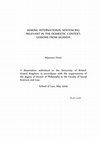
This thesis is about achieving local procedural legitimacy through fair, culturally relevant sent... more This thesis is about achieving local procedural legitimacy through fair, culturally relevant sentencing procedures. Its scope, is reconciling international due process guarantees and a traditional notion of rights, in sentencing procedures of the International Criminal Court.
My interest in this topic arose from the 2003 Uganda Law Reform Commission study on sentencing legislation reforms. There, participants regarded clan courts as functional in rural areas, because they had more informal, conciliatory sentencing processes than the ‘alien’ national courts. I later became aware that incorporation of traditional restorative processes may also help solve problems of legitimacy at the international level, as manifested in the case of Joseph Kony, discussed in Chapter 1 of this thesis.
I then investigate whether the international sentencing framework could accommodate features of traditional restorative process despite incongruent standards, and if so, how this could be achieved. I argue that procedural rights ought to underpin this reconciliation, harnessing aims of international criminal justice with traditional restorative justice.
Through my translation model, I propose small structural changes to international sentencing practice, and doctrinal reforms based on precedent. Using critical legal analysis and a small empirical study, the thesis demonstrates how translation could achieve just, culturally apposite sentencing outcomes. The International Criminal Tribunal for Rwanda and the Special Court for Sierra Leone provide insight into challenges to accommodating African normative standards. Nominal guidance from the African human rights mechanism and national courts, on an African notion of procedural fairness, further complicates this reconciliation. I conclude that we could translate laws across divergent legal systems, drawing from experiences of clan courts that assimilate legal structures and concepts from national courts. Major international instruments: Rome Statute 1998, United Nations International Covenant on Civil and Political Rights 1966 and the African Charter on Human and Peoples’ Rights 1981, are evaluated against this model.
Papers by Maureen Owor- Mapp

International Journal of the Legal Profession , Aug 16, 2014
Discriminatory practices on the grounds of gender preponderate in the performance of judicial dut... more Discriminatory practices on the grounds of gender preponderate in the performance of judicial duties in Uganda. This paper examines the curricula of judicial education providers, most particularly the Law Development Centre in Uganda. Its post-graduate Diploma in Legal Practice is a prerequisite for appointment as a judicial officer. We argue that persistent omission of consideration of linkages between law and the social realities of gender contributes to ongoing gender bias and insensitivity by judicial officers. The Uganda Gender Policy as revised in 2007 obliges public institutions such as the Law Development Centre to integrate gender and equality into their programmes. We examine the institutional norms and culture which constrain inclusion of gender-related content and skills development in the curriculum. We argue that a paradigm shift in the approach to curriculum review is vital if the Law Development Centre is to put into practice the Uganda Gender Policy.

Journal of African Law, Aug 29, 2012
This article examines the contribution of clans (kinship institutions) to the administration of j... more This article examines the contribution of clans (kinship institutions) to the administration of justice within the context of standards set out in the African regional human rights instruments. Field work on the Jopadhola of Eastern Uganda is drawn upon, to explore how clans reproduce their notion of an independent court using an abridged legal doctrine of separation of powers, and partially mimicking lower level government and judicial features. The field work also shows how clans accommodate interests of women and youth. Even so, clans retain a largely customary approach to the appointment, qualifications and tenure of court
officials. The main findings lead to the conclusion that, by applying an “African” notion of human rights, clans have created traditional constructs of an independent court: one that is culturally appropriate for their indigenous communities.

African Journal of Crime and Criminal Justice , Dec 12, 2011
This paper supports the teaching of cybercrime in the Law Development Centre’s post graduate Bar ... more This paper supports the teaching of cybercrime in the Law Development Centre’s post graduate Bar course, because cybercrime is a nascent area with international dimensions of which empirical evidence exists. Furthermore, on the February 14, 2011, Uganda enacted its first cybercrime legislation- the Computer Misuse Act 2011. The paper aims to stimulate debate on the effectiveness of the Act in dealing with terrorist acts that are perpetuated by use of computers. An e-mail allegedly linked to the July 11 2010 deadly bombings in Kampala, provides a lens through which two aspects of the Computer Misuse Act are examined namely: the narrow definition of computer misuse; and the inadequate provisions on proportionality and human rights, and judicial oversight in the procedural framework. Such an e-mail is a learning material well suited for the problem-based learning methods applied during the Bar Course. By way of concluding reflection, the author highlights research and training, as a means by which legal solutions to the lacunae in the legislation may be found.
Talks by Maureen Owor- Mapp

This article examines the impartiality of clan (traditional) courts within the context of standar... more This article examines the impartiality of clan (traditional) courts within the context of standards set out in the African Regional human rights instruments. Participant’s views, a court case and a trial simulation from a field study among the Jopadhola of Eastern Uganda are drawn upon here to illustrate how clan courts resolve threats to their impartiality. Clan courts face interference from the state, accusations of bias, and intimidation from individuals. Although clan courts used a shared ‘judicial’ function based on participatory justice, they nonetheless try to achieve objectivity by involving lower level government officials in decision making and constituting a ‘mixed’ bench of ‘judicial’ officials. These shifts in local practices however, do not embrace modern concepts of equality regarding the participation of women and youth in clan court proceedings. The outcome is a trial based on an ‘expanded’ notion of impartiality- one that melds legal notions of impartiality with a traditional ‘communal’ concept of neutrality.

Despite the enactment of primary legislation in Africa to punish perpetrators of domestic violenc... more Despite the enactment of primary legislation in Africa to punish perpetrators of domestic violence, at the localised level, cases of domestic violence continue to be handled by kinship bodies that form part of what is referred to in legal parlance as ‘traditional courts’. The legal reality is that the African regional human rights instruments place a positive duty on traditional courts to protect and enforce human rights within their settings. The process of negotiation and the use of ritual penalties in kinship justice make important study because of the complexity of transferring international human rights norms to praxis. When human rights law does not speak to kinship practices and when human rights instruments place a duty on kinship bodies to apply human rights norms, the outcome is a truncated version of rights that leans towards protection of the group.
Domestic violence is an appropriate base from which the application of human rights standards in kinship settings can be assessed. This is because the penal regime of kinship courts that handle domestic violence remains under researched. As a result, the localised interpretation of human rights law on the negotiation process and ritual penalties is relatively unknown. This article therefore seeks to put into perspective the overall impact that the African regional human rights instruments could have on the penal regime of kinship units.

In African countries, facilitating access to justice by adopting customary structures within dome... more In African countries, facilitating access to justice by adopting customary structures within domestic legal systems poses normative challenges that arise from a failure to adopt a theoretically grounded approach to melding the two frameworks. Typically, criminal justice legislation in commonwealth African countries retains vestiges of received British law, complete with its dispute oriented nature underpinned by absolute judicial discretion. Such features sit in contradistinction to local customary frameworks that encompass participatory approaches that eschew any form of judicial control. Nowhere is this juxtaposition clearer than in sentencing, where under domestic laws, the final sentence is decided and delivered (arbitrarily) by the judicial officer. By contrast, in traditional kinship societies, the sentence is not only decided in a consensual setting but the whole sentencing process is therapeutic, aimed to re-educate the parties to the dispute through a type of social learning.
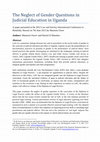
"Lack of a systematic linkage between law and its procedures to the social reality of gender in t... more "Lack of a systematic linkage between law and its procedures to the social reality of gender in the curricula of judicial education providers in Uganda, explains in part the preponderance of discriminatory practices on grounds of gender in the performance of judicial duties. Such biased practices like gender stereotyping are attributed to the inadequate training of judicial officers in gender related theory (Justice Law and Order Sector, Gender and Access to Justice, 2001; Uganda Gender Policy, 2007). Insufficient training in gender issues arises from a failure to implement the Uganda Gender Policy 1997 (revised in 2007) that obligates autonomous government institutions, including those that provide judicial education, to integrate gender and equality into their programmes.
Such institutions include the Law Development Centre (LDC) that offers a post graduate Diploma in Legal Practice - a pre-requisite for appointment to judicial office. Despite the directives in this Policy, LDC has not integrated gender into the Diploma in Legal Practice curriculum. Given the anecdotal evidence of gaps in judicial education and the failure of LDC to incorporate gender in its curriculum, an inquiry into the causes, consequences and solutions to this exclusion is apt. Basing on their experience as trainers at LDC, the authors adopt a self reflexive critique of the Diploma in Legal Practice.
This paper examines the neglect of gender questions in the curriculum of the Diploma in Legal Practice within the milieu of the Uganda Gender Policy. A review of the literature shows that the key issues revolve around the role of LDC as the sole statutory provider of practical legal training. Various government reviews of legal education spanning over three decades (1969 - 2008), have recommended that the Diploma in Legal Practice curriculum be reassessed in such a manner as to provide effective practical legal training. LDC has adopted these recommendations to reflect this emphasis on imparting practical skills to intending legal practitioners and judicial officers. This has led to the omission of ‘non legal’ subjects like gender that are equally relevant to the manner in which judicial duties are executed.
Three factors underline this disregard of gender. Firstly, the curriculum being largely skills-based is not animated by a theoretical framework (unlike the curricula at Law Schools) and thus is not grounded in the theory of gender. Secondly, parochial attitudes in the ongoing curriculum review regarding subject content have resulted in a narrow focus on ‘black letter law’, effectively excluding the social context of gender. Thirdly, failure to engage with organisations like the Judicial Studies Institute that provide continuing judicial education to judicial officers exacerbates this legalist approach to judicial education. Ultimately, the lack of a significant body of teaching and learning materials on gender in judicial education, has led to a model of legal training that is not gender ‘responsive’. The paper therefore recommends a paradigm shift in judicial education: one that facilitates a better understanding of the place of gender and equality in judicial work."
Teaching Documents by Maureen Owor- Mapp
These notes aim to give guidance to the presenters to help them deliver a convincing argument on ... more These notes aim to give guidance to the presenters to help them deliver a convincing argument on this topic.
Round table reports by Maureen Owor- Mapp

The aim of the discussion was to create awareness about the use of virtual currencies in Uganda; ... more The aim of the discussion was to create awareness about the use of virtual currencies in Uganda; to share findings of the Commonwealth Virtual Currencies Survey (2015) on Uganda; to compare individual and institutional experiences; and to develop instructive guidance on effective ways with which to regulate this new form of crypto currency in Uganda. The Kampala event drew participants from the parliamentary service, academia, financial investigatory and regulatory bodies, Chamber of Commerce and Industry, private Fintech advisory companies, and the insurance sector. Panelists came from Guiding principles that aimed to underpin any legal or regulatory framework were drafted by participants along thematic lines of technology, policy, law, investigatory, prosecutorial and adjudicatory issues. Participants underscored the need for comprehensive policies and strategies and awareness-raising among the public, the private sector and among rural communities. The principles will be further developed at the next meeting, in line with Uganda's laws and existing policies on finance, the economy, monetary matters, on information communication technology and cybersecurity. This report covers the panel talks, discussions, recommendations and the draft guiding principles. The second roundtable event is scheduled to take place in July 2017.
The Declaration consolidates the recommendations of the first and the second Round Tables to deve... more The Declaration consolidates the recommendations of the first and the second Round Tables to develop principled guidance that promotes the fundamental principles and rights enshrined in the international, regional and national laws and regulatory frameworks, and integrates the Resolutions of the First Round Table on cryptocurrency regulation.
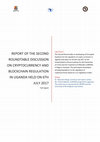
The second roundtable brought together policy makers, the judiciary, financial regulators includi... more The second roundtable brought together policy makers, the judiciary, financial regulators including the Central Bank of Uganda, financial supervisors, the police, cryptocurrency businesses and academia in critical discourse on the complex legal, socio cultural and policy issues of regulating crypto currencies and the implications of regulation for the wider meanings of currency.
Participants agreed a number of recommendations and the need for principled guidance in line with the commitment of policy makers and regulators to promote technological neutrality, co-regulatory approaches, socio-cultural legitimacy, consumer protection and ethical practices that were fair, non-discriminatory and non-deceptive, and were underpinned by the principle of legality. To make it relevant to Uganda’s emergent tech enabled economy, the principles would be integrated into existing policies like the monetary policy, into strategies like the digital strategy, and into awareness-raising measures.
Policy Maker workshops (UNAFRI-Birmingham) by Maureen Owor- Mapp
UNAFRI -Birmingham report of workshop proceedings, 2019
The two-day workshop aimed at knowledge exchange among key policy making agencies, academia, the ... more The two-day workshop aimed at knowledge exchange among key policy making agencies, academia, the private sector, and the general public on ways of developing a multi sectoral approach to the regulation of emerging disruptive technologies like the blockchain, cryptocurrencies and artificial intelligence, in East Africa.
The Minister of State (General Duties) for Finance, Planning and Economic Development, Dr. Gabriel Ajedra Aridru delivered the Keynote address.
Participants adopted a series of recommendations on policy and legal development. Members of the Working Group on the regulation of digital assets and financial technologies that was formed in 2018, developed a research brief on Fintech policy that was presented to the Minister.
Policy Makers Workshop on Regulation of Cryptocurrency and the Blockchain, 2018
The first policy makers workshop in Uganda on the regulation of crypto currencies and the Blockch... more The first policy makers workshop in Uganda on the regulation of crypto currencies and the Blockchain, took place on the 4th and the 5th July 2018 at the Golden Tulip Hotel in Kampala. The aim of the workshop was to consider proposals for public consultations that drew on multi-sectoral approaches to policy making. A new interdisciplinary Working Group was set up to write a research brief that could form the basis on which the proposed Task Force on the Blockchain could develop a public facing policy consultation document on the regulation of distributed ledger technologies in Uganda.
• Dr. Maureen Mapp, Convenor and report co-author.
• Mr. Solomon Rukundo, report co-author
• Mr. Patrick Mwaita- (UNAFRI) programme organiser.
The event was co-sponsored by UNAFRI and the University of Birmingham Law School.
Book chapter by Maureen Owor- Mapp
Gender and Judicial Education Raising Gender Awareness of Judges (Ulrike Schultz, T. Brettel Dawson, Gisela Shaw, Eds), 2019
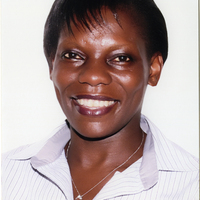





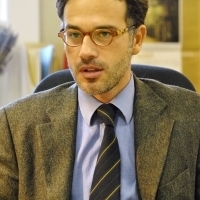




Uploads
Books by Maureen Owor- Mapp
My interest in this topic arose from the 2003 Uganda Law Reform Commission study on sentencing legislation reforms. There, participants regarded clan courts as functional in rural areas, because they had more informal, conciliatory sentencing processes than the ‘alien’ national courts. I later became aware that incorporation of traditional restorative processes may also help solve problems of legitimacy at the international level, as manifested in the case of Joseph Kony, discussed in Chapter 1 of this thesis.
I then investigate whether the international sentencing framework could accommodate features of traditional restorative process despite incongruent standards, and if so, how this could be achieved. I argue that procedural rights ought to underpin this reconciliation, harnessing aims of international criminal justice with traditional restorative justice.
Through my translation model, I propose small structural changes to international sentencing practice, and doctrinal reforms based on precedent. Using critical legal analysis and a small empirical study, the thesis demonstrates how translation could achieve just, culturally apposite sentencing outcomes. The International Criminal Tribunal for Rwanda and the Special Court for Sierra Leone provide insight into challenges to accommodating African normative standards. Nominal guidance from the African human rights mechanism and national courts, on an African notion of procedural fairness, further complicates this reconciliation. I conclude that we could translate laws across divergent legal systems, drawing from experiences of clan courts that assimilate legal structures and concepts from national courts. Major international instruments: Rome Statute 1998, United Nations International Covenant on Civil and Political Rights 1966 and the African Charter on Human and Peoples’ Rights 1981, are evaluated against this model.
Papers by Maureen Owor- Mapp
officials. The main findings lead to the conclusion that, by applying an “African” notion of human rights, clans have created traditional constructs of an independent court: one that is culturally appropriate for their indigenous communities.
Talks by Maureen Owor- Mapp
Domestic violence is an appropriate base from which the application of human rights standards in kinship settings can be assessed. This is because the penal regime of kinship courts that handle domestic violence remains under researched. As a result, the localised interpretation of human rights law on the negotiation process and ritual penalties is relatively unknown. This article therefore seeks to put into perspective the overall impact that the African regional human rights instruments could have on the penal regime of kinship units.
Such institutions include the Law Development Centre (LDC) that offers a post graduate Diploma in Legal Practice - a pre-requisite for appointment to judicial office. Despite the directives in this Policy, LDC has not integrated gender into the Diploma in Legal Practice curriculum. Given the anecdotal evidence of gaps in judicial education and the failure of LDC to incorporate gender in its curriculum, an inquiry into the causes, consequences and solutions to this exclusion is apt. Basing on their experience as trainers at LDC, the authors adopt a self reflexive critique of the Diploma in Legal Practice.
This paper examines the neglect of gender questions in the curriculum of the Diploma in Legal Practice within the milieu of the Uganda Gender Policy. A review of the literature shows that the key issues revolve around the role of LDC as the sole statutory provider of practical legal training. Various government reviews of legal education spanning over three decades (1969 - 2008), have recommended that the Diploma in Legal Practice curriculum be reassessed in such a manner as to provide effective practical legal training. LDC has adopted these recommendations to reflect this emphasis on imparting practical skills to intending legal practitioners and judicial officers. This has led to the omission of ‘non legal’ subjects like gender that are equally relevant to the manner in which judicial duties are executed.
Three factors underline this disregard of gender. Firstly, the curriculum being largely skills-based is not animated by a theoretical framework (unlike the curricula at Law Schools) and thus is not grounded in the theory of gender. Secondly, parochial attitudes in the ongoing curriculum review regarding subject content have resulted in a narrow focus on ‘black letter law’, effectively excluding the social context of gender. Thirdly, failure to engage with organisations like the Judicial Studies Institute that provide continuing judicial education to judicial officers exacerbates this legalist approach to judicial education. Ultimately, the lack of a significant body of teaching and learning materials on gender in judicial education, has led to a model of legal training that is not gender ‘responsive’. The paper therefore recommends a paradigm shift in judicial education: one that facilitates a better understanding of the place of gender and equality in judicial work."
Teaching Documents by Maureen Owor- Mapp
Round table reports by Maureen Owor- Mapp
Participants agreed a number of recommendations and the need for principled guidance in line with the commitment of policy makers and regulators to promote technological neutrality, co-regulatory approaches, socio-cultural legitimacy, consumer protection and ethical practices that were fair, non-discriminatory and non-deceptive, and were underpinned by the principle of legality. To make it relevant to Uganda’s emergent tech enabled economy, the principles would be integrated into existing policies like the monetary policy, into strategies like the digital strategy, and into awareness-raising measures.
Policy Maker workshops (UNAFRI-Birmingham) by Maureen Owor- Mapp
The Minister of State (General Duties) for Finance, Planning and Economic Development, Dr. Gabriel Ajedra Aridru delivered the Keynote address.
Participants adopted a series of recommendations on policy and legal development. Members of the Working Group on the regulation of digital assets and financial technologies that was formed in 2018, developed a research brief on Fintech policy that was presented to the Minister.
• Dr. Maureen Mapp, Convenor and report co-author.
• Mr. Solomon Rukundo, report co-author
• Mr. Patrick Mwaita- (UNAFRI) programme organiser.
The event was co-sponsored by UNAFRI and the University of Birmingham Law School.
Book chapter by Maureen Owor- Mapp
My interest in this topic arose from the 2003 Uganda Law Reform Commission study on sentencing legislation reforms. There, participants regarded clan courts as functional in rural areas, because they had more informal, conciliatory sentencing processes than the ‘alien’ national courts. I later became aware that incorporation of traditional restorative processes may also help solve problems of legitimacy at the international level, as manifested in the case of Joseph Kony, discussed in Chapter 1 of this thesis.
I then investigate whether the international sentencing framework could accommodate features of traditional restorative process despite incongruent standards, and if so, how this could be achieved. I argue that procedural rights ought to underpin this reconciliation, harnessing aims of international criminal justice with traditional restorative justice.
Through my translation model, I propose small structural changes to international sentencing practice, and doctrinal reforms based on precedent. Using critical legal analysis and a small empirical study, the thesis demonstrates how translation could achieve just, culturally apposite sentencing outcomes. The International Criminal Tribunal for Rwanda and the Special Court for Sierra Leone provide insight into challenges to accommodating African normative standards. Nominal guidance from the African human rights mechanism and national courts, on an African notion of procedural fairness, further complicates this reconciliation. I conclude that we could translate laws across divergent legal systems, drawing from experiences of clan courts that assimilate legal structures and concepts from national courts. Major international instruments: Rome Statute 1998, United Nations International Covenant on Civil and Political Rights 1966 and the African Charter on Human and Peoples’ Rights 1981, are evaluated against this model.
officials. The main findings lead to the conclusion that, by applying an “African” notion of human rights, clans have created traditional constructs of an independent court: one that is culturally appropriate for their indigenous communities.
Domestic violence is an appropriate base from which the application of human rights standards in kinship settings can be assessed. This is because the penal regime of kinship courts that handle domestic violence remains under researched. As a result, the localised interpretation of human rights law on the negotiation process and ritual penalties is relatively unknown. This article therefore seeks to put into perspective the overall impact that the African regional human rights instruments could have on the penal regime of kinship units.
Such institutions include the Law Development Centre (LDC) that offers a post graduate Diploma in Legal Practice - a pre-requisite for appointment to judicial office. Despite the directives in this Policy, LDC has not integrated gender into the Diploma in Legal Practice curriculum. Given the anecdotal evidence of gaps in judicial education and the failure of LDC to incorporate gender in its curriculum, an inquiry into the causes, consequences and solutions to this exclusion is apt. Basing on their experience as trainers at LDC, the authors adopt a self reflexive critique of the Diploma in Legal Practice.
This paper examines the neglect of gender questions in the curriculum of the Diploma in Legal Practice within the milieu of the Uganda Gender Policy. A review of the literature shows that the key issues revolve around the role of LDC as the sole statutory provider of practical legal training. Various government reviews of legal education spanning over three decades (1969 - 2008), have recommended that the Diploma in Legal Practice curriculum be reassessed in such a manner as to provide effective practical legal training. LDC has adopted these recommendations to reflect this emphasis on imparting practical skills to intending legal practitioners and judicial officers. This has led to the omission of ‘non legal’ subjects like gender that are equally relevant to the manner in which judicial duties are executed.
Three factors underline this disregard of gender. Firstly, the curriculum being largely skills-based is not animated by a theoretical framework (unlike the curricula at Law Schools) and thus is not grounded in the theory of gender. Secondly, parochial attitudes in the ongoing curriculum review regarding subject content have resulted in a narrow focus on ‘black letter law’, effectively excluding the social context of gender. Thirdly, failure to engage with organisations like the Judicial Studies Institute that provide continuing judicial education to judicial officers exacerbates this legalist approach to judicial education. Ultimately, the lack of a significant body of teaching and learning materials on gender in judicial education, has led to a model of legal training that is not gender ‘responsive’. The paper therefore recommends a paradigm shift in judicial education: one that facilitates a better understanding of the place of gender and equality in judicial work."
Participants agreed a number of recommendations and the need for principled guidance in line with the commitment of policy makers and regulators to promote technological neutrality, co-regulatory approaches, socio-cultural legitimacy, consumer protection and ethical practices that were fair, non-discriminatory and non-deceptive, and were underpinned by the principle of legality. To make it relevant to Uganda’s emergent tech enabled economy, the principles would be integrated into existing policies like the monetary policy, into strategies like the digital strategy, and into awareness-raising measures.
The Minister of State (General Duties) for Finance, Planning and Economic Development, Dr. Gabriel Ajedra Aridru delivered the Keynote address.
Participants adopted a series of recommendations on policy and legal development. Members of the Working Group on the regulation of digital assets and financial technologies that was formed in 2018, developed a research brief on Fintech policy that was presented to the Minister.
• Dr. Maureen Mapp, Convenor and report co-author.
• Mr. Solomon Rukundo, report co-author
• Mr. Patrick Mwaita- (UNAFRI) programme organiser.
The event was co-sponsored by UNAFRI and the University of Birmingham Law School.